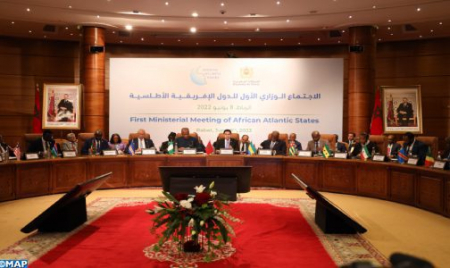Atlantic Africa Has Almost All it Takes to Be Zone of Peace, Stability and Shared Prosperity – FM –
Atlantic Africa has almost all it takes to be a zone of peace, stability and shared prosperity, said Wednesday in Rabat, Minister of Foreign Affairs, African Cooperation and Moroccans Abroad, Nasser Bourita. “Atlantic Africa has almost all it takes to be a zone of peace, stability and shared prosperity. At least, it has the potential,” said Bourita at the opening of the 1st ministerial meeting of the African Atlantic States, which is held with the participation of 21 countries of the Atlantic coast, including fifteen represented at ministerial level. Bourita recalled that since 2013, His Majesty King Mohammed VI called for “reviving the activities of the Conference of African Atlantic States and allowing it to play fully the role it deserves”. The process born in Rabat in 2009 is reborn today under a new light, “but with the same horizon that we share, from Cape Spartel to the Cape of Good Hope,” said Bourita, emphasizing the strategic importance of this space that is no longer to prove. With 23 African Atlantic countries representing 46% of the African population, this space concentrates 55% of African GDP and its economies achieve 57% of continental trade, he said, considering this space as an area of mobility and a place of cultural and ethnic mixing. “Our maritime spaces contain enormous biological and non-biological resources,” he said. The minister said that Atlantic Africa is a space of covetousness and competition, facing unprecedented security challenges, with the rise of asymmetric threats, transnational crime, maritime insecurity, piracy, terrorism and organized crime. In this sense, the minister noted that nearly 90% of maritime incidents, including piracy, were recorded along the continental Atlantic coastline, estimating that “our continent which suffers 48% of victims of terrorism in the world sees the terrorist threat is established along the Atlantic coast”. Bourita also said that transnational crime is both a cause and a consequence of the weak security network, the weakness of the state presence, the porous border and political and institutional instability. Atlantic Africa is breaking records in terms of climate vulnerability, noted Bourita, adding that the coastalization of our activities exacerbates environmental issues, with major consequences on food security and displacement with nearly 1.4 million internally displaced persons recorded for the West African region alone. “Global warming is leading to an annual rise in African Atlantic waters of nearly 3.6 millimeters, directly impacting economic activities and coastal life,” said Bourita, recalling that the development of a climate early warning system would, according to the International Monetary Fund, reduce the risk of food by 30% on the continent, including the Atlantic coast. In addition, there are the challenges of human development, economic development, sustainable development and development in general, added the minister, noting that the African Atlantic countries receive only 4% of FDI flows to the Atlantic area against 74% for the countries of the northern shore and this, despite the growing economic potential of Atlantic Africa. “We condemn ourselves to not reap the potential of our space, if we do not mobilize its potential for cooperation. For it is not enough to share the Atlantic. It is also to share a perspective, a vision and actions,” said the minister, insisting that this space is geopolitical, have a strategic identity and act collectively, to meet the imperatives of security, sustainable development and prosperity in this area.

